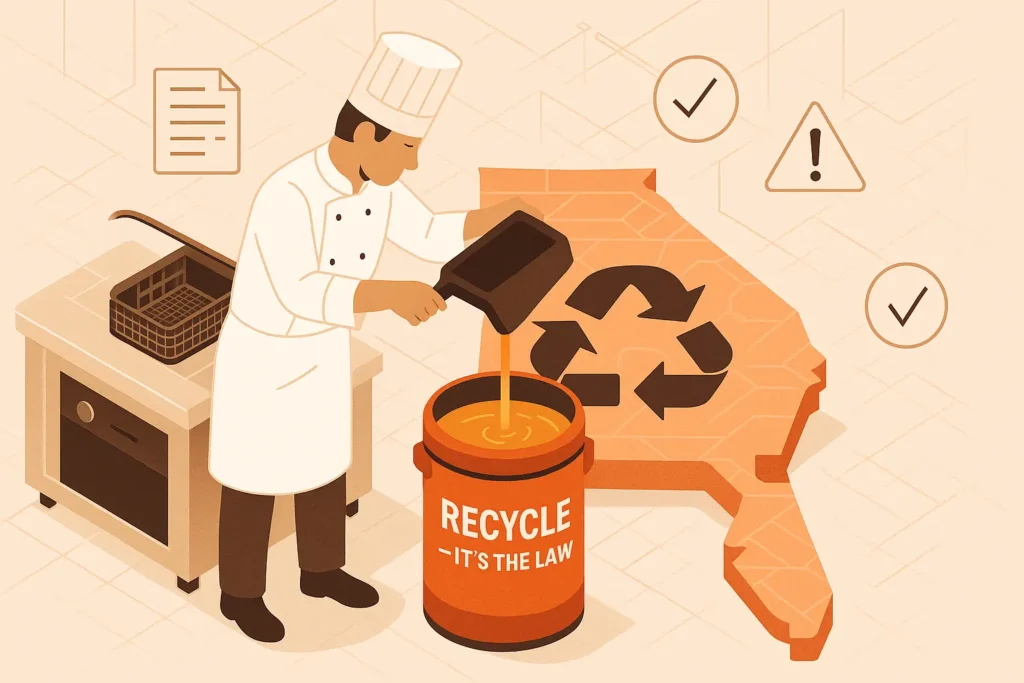Table of Contents
Is Cooking Oil Recycling Really Mandatory?
- Federal EPA rules treat used cooking oil as “used oil” and presume it will be recycled, not dumped, under 40 CFR Part 279.
- Florida, Georgia, and New Jersey all echo that stance in state law, making recycling compulsory for commercial kitchens.
- Local sewer codes then add grease trap service schedules, turning a best practice into a legal must.
- Bottom line: if you deep fry for profit, recycling isn’t optional it’s your license to operate.

Florida: State & County Rules You Can’t Ignore
- Florida Statute 403.751 bans any disposal “that endangers public health,” including dumping oil down drains.
- Since July 1 2022, every restaurant must keep a signed service manifest on site for one year.
- Miami Dade’s FOG code (Sec 24 42.6) tightens things further: gravity traps must be cleaned at least every 60 days and never exceed 25 % grease.
- Fail a surprise inspection and DEP can seek civil penalties up to $10 000 per offense or $75 000 per day for major spills.
- Grease Connections clients across Miami, Orlando, and Key West get real time tank alerts that flag fill levels before inspectors do.
Georgia: From State Rule 391 3 6 .24 to Atlanta’s 14 Day Clock
- Georgia EPD requires a manifest trail for every gallon of FOG moved off site.
- Atlanta shortens the state’s 90 day pump out myth to 14 days if traps hit 25 % full, with $1 000 daily fines and $100 re inspection fees.
- County programs Fulton, DeKalb, Chatham stack on their own permits and first offense tickets from $250 up.
- Skip recycling and you risk health department closures, as a Duluth eatery learned this spring.
- Grease Connections’ leak proof caddies fit tight Atlanta alleys and upload pump data straight to city portals so you stay 14 day compliant without thinking.
New Jersey: Class D Recycling & Local Heat
- NJDEP classifies used cooking oil as a “Class D recyclable,” meaning only A 901 licensed firms may collect it.
- State food waste law now tracks large generators’ oil volumes for energy recovery reports.
- Town codes, such as Mount Olive and New Milford, fine $250 $1 000 per day and can shut drains for repeat offenses.
- Boardwalk vendors face $1 000 dune spill tickets during shore season.
- Our shore rated, hurricane proof tanks stayed watertight through four 2024 storms zero leaks, zero fines a record inspectors can verify.
What Happens If You Don’t Recycle?
- Florida DEP can levy $10 000 per violation plus damages.
- Atlanta uses Chapter 154 to charge $1 000 daily and, in extreme cases, jail time.
- Georgia state code layers a $2 500 per load penalty on illegal dumping.
- New Jersey municipalities escalate to $1 000 a day and possible sewer disconnection.
- Insurance carriers may also void spill claims when rules are ignored, driving costs higher than the fine itself.
Penalties at a Glance
| State | Daily Fine Range | Extra Actions |
|---|---|---|
| FL | Up to $10 000 | DEP can revoke permits |
| GA | $1 000 city / $2 500 state | Re inspection fees |
| NJ | $250 $1 000 | Drain shut off |
How to Stay Compliant Without Lifting a Lid
- Use a licensed collection company. EPA and state rules put liability on you if the transporter dumps illegally.
- Keep the manifest. Florida, Georgia, and NJ all require signed logs on site for up to one year.
- Monitor fill levels. Miami Dade’s 60 day limit and Atlanta’s 14 day rule trigger based on percentage full, so data beats guesswork.
- Grease Connections automates all three: our sensors text you and the inspector proof of every pickup.
Required Records Checklist
| Document | FL | GA | NJ | Keep On Site |
|---|---|---|---|---|
| Signed Service Manifest | ✓ | ✓ | ✓ | 1 yr |
| Grease Trap Clean out Log | ✓ (county) | ✓ (city) | ✓ (municipal) | 3 yrs |
| A 901 Transporter License Copy | — | — | ✓ | Until Expired |
The Grease Connections “We Pay the Fine” Guarantee
Missed pickup? We pay any city, county, or state oil spill fine no questions asked then credit your next invoice. Our 24/7 monitored tanks, hurricane proof lids, and proactive routing have delivered zero FOG citations across 24 random inspections in 2024 (records on file). Pair that with live customer dashboards and instant manifest downloads, and compliance becomes worry free revenue.
Frequently Asked Questions
Are restaurants legally required to recycle cooking oil? Yes. EPA Part 279 sets the floor, and every Florida, Georgia, and NJ county we serve makes recycling mandatory.
Can a business lose its license for violations? Health departments may suspend food service permits after repeat FOG citations, as reported in Duluth, GA.
Who enforces the rules? Local pretreatment staff backed by state DEP/EPD inspectors. They review manifests and sample trap effluent.
How long must I keep paperwork? One year for manifests in FL and GA; up to three in many NJ towns.








